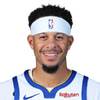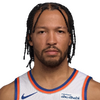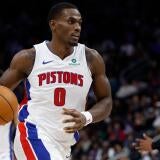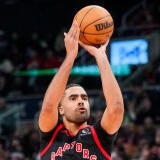
Mavericks finding the right balance in a crowded backcourt will be crucial to their success
The Mavs have five distinctly different guards at their disposal who can all help Dallas get back to the postseason
Rick Carlisle's offenses have always thrived on having multiple ball-handlers, and the Dallas Mavericks' 2019-20 roster might hold the best group of guards they've had had since their 2011 championship team. The use of those guards, though, will play a key role in Dallas' success this season.
The Mavericks added Delon Wright and Seth Curry and re-signed JJ Barea to give Dallas a versatile group of guards to play with. That, on top of already having reigning Rookie of the Year Luka Doncic and Jalen Brunson, who you can argue was the steal of the draft in 2018, brings Dallas' guard total to five. Tim Hardaway Jr. is technically classified as a shooting guard. However, with the logjam of guards Dallas has, he'll likely see most of his minutes come at the small forward spot with Justin Jackson and Dorian Finney-Smith.
Doncic and Wright will likely fill the starting backcourt for Dallas, but with so many weapons at Carlisle's disposal, how and when he utilizes the remaining guards will be interesting to watch. Carlisle has always been somewhat of a curmudgeon when it comes to playing younger players. In the past, he has relied heavily on guys he's had experience with, and could trust, like Devin Harris and Barea. However, with Harris no longer on the team, and Barea entering his 14th year in the league, Carlisle will have to put his trust in the newer, younger players this season.
Not including Doncic, for obvious reasons, here's how the Mavs should prioritize their guards going into the 2019-20 season.
Wright gives Dallas something it hasn't had in awhile, a lengthy guard who can defend both backcourt positions and can work on the ball just as well as he can move without it. He's an ideal starting partner for Doncic; someone who can make up for Doncic's defensive lapses, and can let Doncic dictate the offense without minimizing his own talents. He has a strong first step to get to the rim, which is where Wright does most of his damage.
Last year, Wright played contrasting roles from his time in Toronto to his time in Memphis. With the Raptors, Wright was far more efficient coming off the bench with Fred VanVleet. The two were able to share ball-handling duties, and Wright didn't have to shoulder most of the offensive load. His scoring numbers weren't much to get excited about. However, he was shooting the ball at an efficient clip. Then, when Wright was traded to Memphis, his role changed. He was playing 30 minutes a game, and was starting more, and was tasked with being the sole ball-handler on a diminished Grizzlies team. In that role, his scoring numbers went up, though his efficiency went down, with his 3-point shot dipping to below 30 percent on the season.
In the final week of last season, Wright put up a triple-double in back-to-back games against the Mavericks, which is what many people might point to as what he can bring to Dallas. Yes, those are mouthwatering boxscores to look at, but that's unlikely to happen in Dallas. Wright's role isn't to get triple-doubles; that's what Doncic is for. He'll work as a secondary ball-handler with Doncic on the floor, similar to his time in Toronto with VanVleet.
There will be times where he'll be running the offense, but the attractive part of his game is his ability to guard, and impact the game without the ball in his hands. Since he won't have the ball in his hands most of the time, he'll need to improve on his 3-point shooting so when Doncic inevitably dishes one of those no-look passes to him on the perimeter, he can knock them down.
Last season, Curry shot 45 percent from 3, which was third-best in the league, and a spot above his brother, Steph Curry. Coming off the bench for Portland, Curry provided much-needed scoring, and proved he can shoot the 3 in a number of ways, whether it's off a screen, in transition or as a spot-up shooter. If he's sharing the floor with Doncic in the backcourt with Porzingis down low, Curry will be the ultimate floor spacer, giving Doncic enough room to utilize his best skill -- playmaking -- and for Porzingis to use any number of tricks in his bag in the post or facing up to the basket. If defenses collapse on either player, Curry will likely be open on the wing ready to knock down a 3.
This should be a breath of fresh air specifically for Doncic, as there were a handful of times last season he would kick it out to the open man on the 3-point line only for them to miss it more times than not. Having a serious sharpshooter for Doncic to work with will only elevate his playmaking abilities.
Curry could actually start alongside Doncic, depending on what Carlisle is looking for. If he wants to sacrifice defense for automatic offense, then a backcourt of Doncic and Curry will put up numbers offensively. If Curry's coming off the bench, which should be expected most nights, he could act as the backup point guard in spurts, and run a dangerous pick-and-roll game with either Maxi Kleber or Dwight Powell. If Curry is able to replicate his shooting numbers from last year, it will be hard to keep him off the floor, especially since the Mavs have committed to paying him $32 million over the next four years.
His stats may be deceiving, but Brunson put together an impressive rookie campaign in Dallas last year. He doesn't put up ridiculous numbers or make highlight-reel passes like Doncic, but as a 22-year-old rookie he brought with him maturity and experience playing in pressure situations at Villanova. It wasn't until Barea was sidelined for the season, and Dennis Smith Jr. was traded to the Knicks as part of the Porzingis deal, that Brunson was able to showcase everything he could offer. After the All-Star break, Brunson started in all but two of Dallas' games, while averaging 14.5 points, 4.6 assists on 50 percent from the field and 35.2 from beyond the arc.
His chemistry with Doncic on the floor blossomed toward the end of last season, and he provides the Mavericks with more versatility at the point guard position. Brunson's frame -- he's built more like a football player than a basketball player -- helps him absorb contact while finishing at the rim, and he has high-level basketball IQ that not many second-year players possess. Brunson is a stabilizer, he doesn't rush or force anything on offense, and like Wright and Curry, doesn't need the ball in his hands to make a play. On media day, Carlisle spoke about the benefits of having someone like Brunson on his team.
"He gives us great flexibility," Carlisle said. "He can play with the ball and off it, he can defend 1's, 2's ... having Jalen gives us options."
Options, like, if Wright gets hurt -- he's been dealing with a hamstring injury throughout training camp -- Brunson can step into the starting rotation and the Mavericks would be fine. According to Brad Townsend of The Dallas Morning News, Brunson also had a rather impressive offseason.
Several Mavericks folks, separately and unprompted, have told me that the Mav who perhaps has had the most impressive summer is Jalen Brunson.
— Brad Townsend (@townbrad) September 25, 2019
Carlisle said on media day that Brunson got stronger during the summer, and is shooting the ball better than his rookie year. If that's the case, and if Brunson isn't starting, at the very least he's proven that he should be ahead of Barea in the rotation.
As the last remaining member of the 2011 championship team on the Mavs' roster, Barea -- entering Year 14 of his career -- is still as productive as he was as a starter in the Finals. He's still a pest on defense and through a combination of his size, speed and craftiness can still somehow get to the rim. Other than his brief three-year stint in Minnesota, Dallas has been home to Barea, which is why Carlisle relies so heavily on the backup point guard.
Only issue, Barea will try to come back from an Achilles tear at 35 years old, and with the way he plays, there's no telling how it will affect him over the course of the season. Barea signed a one-year deal to remain in Dallas this season, which could very well be his last, and while he's been a steady cog in Carlisle's rotation for years, it may be time to pass the torch to someone like Brunson, who has all the makings of being a Barea-like player, only better.
If both Barea and Brunson are healthy, Carlisle will have a decision to make at some point throughout the season when it comes to who will receive more of the backup minutes. Barea has championship-level experience that is invaluable to a relatively young team, but if he gets priority over Brunson in the rotation, it could hinder Brunson's growth and development. Brunson has far more value to the Mavericks' long-term goals, and as reliable as Barea has been over the years for Dallas, featuring Brunson in the rotation more is the better play for the Mavericks' success.
Dallas has the potential to be a surprising team going into the 2019-20 season, and with a versatile crop of guards Carlisle has several options to throw on the floor on a nightly basis. If the Mavs can find balance in utilizing Wright, Curry, Brunson and Barea, the Mavericks could sneak into the playoffs for the first time since the 2015-16 season.
























